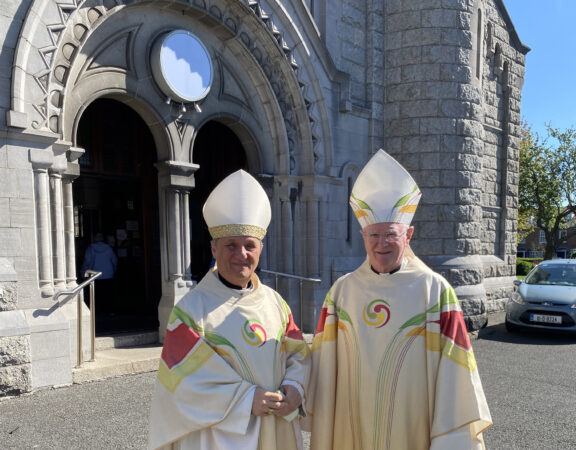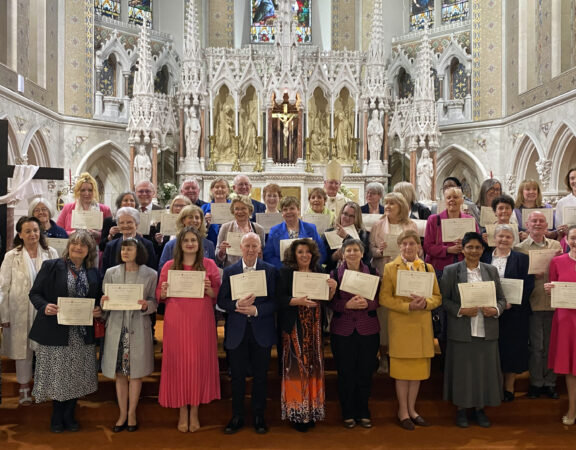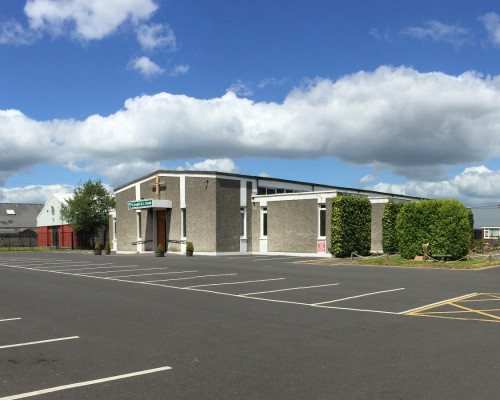Mass for the Mater Dei Institute Graduations 2015
Homily Notes of
Most Rev. Diarmuid Martin
Archbishop of Dublin
———–
Church of the Holy Cross, Clonliffe, 13th November 2015
“Our Gospel reading stresses three themes: fear, faith and doubt. We see the contrast between the serenity of Jesus and the panic that assails the heart of the disciples. Jesus has had a busy day preaching and healing and journeying. When he finally sends the crowd home, he himself goes up on a mountainside to pray and he remains there serene as a storm begins to brew on the lake.
The disciples go back to their work as fishers and they encounter the storm. Jesus calmly comes to them, but walking on the water. The disciples do not recognise him. They had seen Jesus only hours before. He must have been easily recognisable from the clothing he wore and his physical appearance. The disciples fail to recognise Jesus because they allow fear to overwhelm them. They think that Jesus is a ghost and if you are in panic and you think you see a ghost then I for one would naturally fall into an even deeper panic.
When the disciples finally recognise Jesus, Peter, spontaneous as always and without thinking, asks that he too can walk on the water to encounter Jesus. That idea fails rather rapidly, as Peter takes his eyes off Jesus and become fearful again and begins to sink into the stormy water.
Faith is hard to define. Faith does not possess all the answers and faith is not a magic answer. Faith is not something which does away with all doubt.
Is faith then just a personal feeling? Has it any roots in reality, if we are asked to believe something that we cannot empirically prove? We know however that faith is a much more common thing in our daily life, alongside faith in God. Faith is something without which society would not function. We have faith in our motor mechanics and in our doctors and normally it works; we had faith in our banks and in many cases that faith was betrayed. Married love is founded on faith. If I am seeking a spouse and wondering if this is the person I can really love and share my life with, then my judgement is made not just on the facts of the goodness and tenderness and dependability of the person, but also on a faith that I must put in that person in the face of so many unknowns.
Doubt is of the essence of faith. You might find that something surprising to hear, especially coming from a bishop who many think should be a rock of certainties. Faith is not however just about theology books and Church documents and ready-made answers but about a relationship with Jesus Christ. Without that relationship with Jesus Christ, then the outward signs of faith can be empty and misleading.
Many bishops were surprised at a comment of Pope Francis at the close of the recent Synod of Bishops when he criticised people who had: “closed hearts which frequently hide even behind the Church’s teachings or good intentions, in order to sit in the chair of Moses and judge, sometimes with superiority and superficiality, difficult cases and wounded families”. The Pope is saying that you can constantly repeat the words of the Church’s teaching and still not have true faith!
Faith in Jesus Christ, to quote the same speech of Pope Francis, is “about trying to view and interpret realities, today’s realities, through God’s eyes, so as to… enlighten people’s hearts in times marked by discouragement, social, economic and moral crisis, and growing pessimism”.
Catholic education is about helping hearts to enter into that logic of God and through that logic to lead people away from discouragement and pessimism. Sadly in many cases we have inherited from our past religious culture a false idea of God as a harsh judgmental God. If we cling to such an idea of God, then we will fall into and pass on to others only a deeper discouragement and pessimism and painful scrupulosity.
The God revealed in Jesus Christ is a God who shows himself above all in mercy and compassion. Our God is a God like the Good Samaritan who sees and recognises suffering and responds, not through social commentary, but in embrace and carrying of the wounded and caring for them until they are finally restored to human fullness.
The God revealed in Jesus Christ is like the Father of the Prodigal Son who is there waiting to embrace and forgive, rather than the older son who has observed all the right rules of loyalty and hard work but remains so caught up in the rules that he misses the joy of seeing his own wayward brother restored.
The God revealed in Jesus Christ is not one who condemns and abandons and leaves alone, but rather like Jesus on the road to Emmaus one who, when the disciples fail to recognise him, continues quietly to journey with them. He does not force himself on them, but touches their hearts slowly so that they can understand the scriptures.
One bishop at the Synod had a rather modern notion of our encounter with Jesus comparing him to a “sat-nav” in our cars. When we decide that we will go our own way, the “sat-nav” does not leave us lost, but quickly reconfigures and offers to get us back on the right route once again.
In the current debates about Catholic schools I am surprised that from the Church side there is often so much emphasis on ownership and rights to ownership. These are important but they are worthless arguments if the Catholic school is not a place where faith in Jesus Christ is presented and lived and witnessed to as a way of living which opens and leads our hearts beyond the merely pragmatic and empirical. The Catholic nature of a school is not guaranteed by title-deeds, but by the way of life and faith that is lived within its walls. I am pleased to see that the new religious education curriculum is bringing that dimension more clearly into focus.
The place of faith within a Catholic school is not indoctrination: it is in fact the opposite – it is about freeing and opening hearts and changing hearts and freeing hearts from fear to bring to our world a new and transforming notion focused on the person of Jesus Christ who cares and who brings interior peace and serenity into troubled hearts.
In congratulating the graduates at today’s ceremony, I wish you God’s blessing for your future and urge you through prayer and reflection especially on the scriptures to open your hearts to the transforming message of love which Jesus Christ has entrusted to us.”









